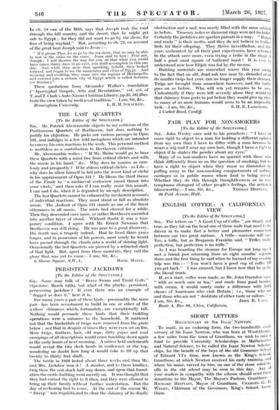THE LAST QUARTETS
[To the Editor of the SrEcrovron.] Sin,----Mr. Patrick Abercrombie objects to my criticism of the Posthumous Quartets of Beethoven, but does nothing to justify his objection. He picks out various passages in Opus 131, and indulges in a few wild Metaphors which are intended to convey his own reactions to the work. This personal method is worthless as a contribution to .Beethoven criticism.
Mr. Abercrombie writes : " If Mr. Maine would go to hear
these Quartets with a mind free from critical clichés and with the music in his hand," &c. Why does he assume so care- lessly and arrogantly ? If he abhors critical clichés—as I do— why does he allow himself to fall into the worst kind of cliché in his appraisement of Opus 131 ? He likens the third theme of the Finale to " a mediaeval corkscrew sword thrust into your vitals," and then asks if I can really resist this assault. I can and I do, when it is degraded by an ugly description.
The last Quartets cannot be enhanced by incoherent accounts
of individual reactions. They must stand or fall as absolute music. The Andante of Opus 131 stands as one of the finest utterances in all music. The mists had cleared for a while. Then they descended once more, or rather Beethoven ascended into another layer of cloud. Without doubt it was a tem- porary condition. I agree with Mr. Ernest Newman that Beethoven was stillrising. He was near to a great discoYery. His death was a tragedy indeed. Had he lived three years longer, and in possession of his powers, most surely he would have passed through the clouds -into a world of shining light. Occasionally the last Quartets are pierced by a refracted shaft of that light. But, apart from these moments, they veil the glory that was yet to come.--I am, Sir, &c.,






















































 Previous page
Previous page